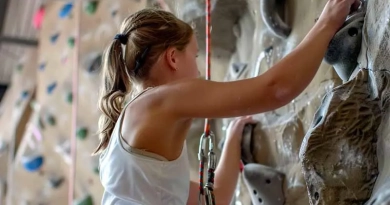
What Mental Challenges Do Climbers Face?
“What mental challenges do climbers face?” It’s a question that cuts to the heart of every climber’s journey. The mental game of climbing is as demanding, if not more so, than the physical aspect. Here’s an in-depth exploration of the mental challenges climbers face, framed within the story of my own ascent.
Climbing isn’t just a test of physical endurance; it’s a profound mental battle. Fear, anxiety, self-doubt, and the pressure to succeed are constant companions. Understanding these challenges is the first step toward overcoming them. How do climbers manage their fears? How do they stay focused and resilient when every move can mean the difference between success and failure?
Climbers face a myriad of mental obstacles, each requiring unique strategies to address:
1. Fear and Anxiety:
- Fear of Falling: This is perhaps the most common fear among climbers. The fear of a fall, even with safety gear, can be paralyzing.
- Fear of Failure: The pressure to succeed, whether from personal expectations or external sources, can create significant anxiety.
2. Mental Fatigue:
- Sustained Focus: Climbing demands continuous mental engagement. The need to stay focused for extended periods can lead to mental exhaustion.
3. Self-Doubt:
- Confidence Issues: Doubting one’s abilities can hinder performance. Positive self-talk and visualization techniques are often employed to counteract this.
4. Overcoming Plateaus:
- Mental Blocks: Climbers often face mental blocks when they reach a plateau in their performance. Breaking through these blocks requires mental toughness and resilience.
The Best Solution
Addressing these mental challenges involves a combination of strategies that build mental resilience, enhance focus, and foster a positive mindset.
1. Visualization Exercises:
- Mental Rehearsal: Visualizing each move of a climb can help prepare the mind for the actual ascent. This technique reduces anxiety by making the climb feel familiar.
- Imagining Success: Picture yourself successfully completing the climb. This boosts confidence and helps create a positive mindset.
2. Positive Self-Talk:
- Affirmations: Replace negative thoughts with positive affirmations. For instance, instead of thinking “I can’t do this,” tell yourself “I am capable and strong.”
- Encouraging Words: During climbs, use encouraging phrases to maintain focus and motivation.
3. Controlled Breathing:
- Breathing Techniques: Deep, controlled breathing helps calm the mind and maintain focus. Use breath as an anchor to stay present and reduce anxiety.
4. Gradual Exposure:
- Progressive Challenges: Start with easier climbs and gradually tackle more difficult routes. This method builds confidence and reduces fear over time.
- Controlled Falls: Practice falling in a safe environment to build trust in your gear and reduce the fear of falling.
5. Building Resilience:
- Set Achievable Goals: Break down climbs into manageable sections. Celebrate small victories to build confidence and resilience.
- Embrace Failure: View setbacks as learning opportunities. Developing a growth mindset helps in bouncing back stronger.
Resources and Tools
To effectively implement these strategies, consider the following resources and tools:
- Books: “Overcoming Fear in Climbing” by REI Co-op and “Mindful Climbing” by The Clymb provide valuable insights and techniques.
- Training Programs: Many climbing gyms offer mental toughness training and workshops.
- Online Communities: Websites like Climbing Tutor and Lifelong Adventure provide articles and forums where climbers share experiences and advice.
- Professional Help: Sports psychologists and therapists specializing in climbing can offer personalized strategies and support.
Conclusion
As the sun set, casting a golden hue over the rocks, I realized that climbing is not just a physical endeavor but a profound mental journey. “What mental challenges do climbers face?” The answer lies in the intricate dance between fear and courage, doubt and confidence, failure and success. By embracing the mental aspects of climbing, using visualization, positive self-talk, controlled breathing, and building resilience, climbers can conquer not just the rock face but also the mental hurdles that come with it. Each climb becomes a testament to their mental fortitude, a journey of self-discovery that reaches far beyond the summit.
Incorporate these practices, leverage the resources, and face the mental challenges head-on. Happy climbing!






